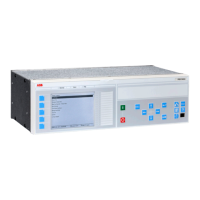according to class P and PR must have a secondary limiting e.m.f. E
alf
that fulfills the
following:
EQUATION1383 V2 EN (Equation 99)
16.1.7.2 Current transformers according to IEC 61869-2, class PX, PXR (and old
IEC 60044-6, class TPS and old British Standard, class X)
CTs according to these classes are specified approximately in the same way by a rated
knee point e.m.f. E
knee
(E
k
for class PX and PXR, E
kneeBS
for class X and the limiting
secondary voltage V
al
for TPS). The value of the E
knee
is lower than the corresponding E
al
according to IEC 61869-2. It is not possible to give a general relation between the E
knee
and the E
al
but normally the E
knee
is approximately 80 % of the E
al
. Therefore, the CTs
according to class PX, PXR, X and TPS must have a rated knee point e.m.f. E
knee
that
fulfills the following:
(1 )= × + - ×
Old Calculated
S TD S TD S
EQUATION1893.ANSI V1 EN (Equation 100)
16.1.7.3 Current transformers according to ANSI/IEEE
Current transformers according to ANSI/IEEE are partly specified in different ways. A
rated secondary terminal voltage V
ANSI
is specified for a CT of class C. V
ANSI
is the
secondary terminal voltage the CT will deliver to a standard burden at 20 times rated
secondary current without exceeding 10 % ratio correction. There are a number of
standardized V
ANSI
values for example, V
ANSI
is 400 V for a C400 CT. A corresponding
rated equivalent limiting secondary e.m.f. E
alANSI
can be estimated as follows:
a lANS I S N CT ANSI S N CT S N bANSI
E 20 I R V 20 I R 20 I Z= × × + = × × + × ×
EQUATION1682 V1 EN
(Equation 101)
where:
Z
bANSI
The impedance (that is, with a complex quantity) of the standard ANSI burden for the specific C class
(W)
V
ANSI
The secondary terminal voltage for the specific C class (V)
Section 16 1MRK 511 286-UUS A
Requirements
352
Application manual

